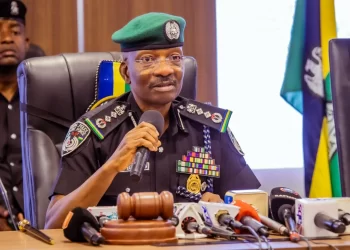- Even the CBN has raised the alarm over Nigeria’s receding economy
It was former United States President Bill Clinton who popularised the famous line: “It’s the economy, stupid,” during his 1992 bid for the White House. Since then, the world has not been able to find a better phrase to alert a government about an impending economic peril. And though it may seem a tad too late in the day to throw in that Clintonian masterpiece, it is better late than never.
The reason is that, even the most important economic manager in the land today – in the absence of a finance minister – the governor of the apex bank, Mr. Godwin Emefiele, could not help but let out a plaintive cry last week. He warned that Nigeria’s economy was at the risk of slipping into a recession.
And we may as well take a cue from Mr. Emefiele and add that, hey, Mr. President Muhammadu Buhari: It’s the economy, seriously! Yes, we acknowledge all the good tidings that have been ushered in since May 29, but again, the most important question would remain: what’s all the good things got to do with the price of bread, and garri and yam?
Yes the coming of the Buhari era has ushered in a flurry of socio-economic changes but those are at best, symbolic, automatic reflex occurrences. The economy of any nation is a series of carefully planned actions such that all things being equal; would yield a set of desired results.
We note here, just as the CBN has also remarked, that the administration of President Buhari has not initiated any set of carefully planned economic actions so far. Rising from its meeting in Abuja last Tuesday, the Monetary Policy Committee (MPC) of the Central Bank of Nigeria warned that the country’s economy could easily slip into a recession next year if the Federal Government does not take proactive steps to stimulate key sectors of the economy.
Some of the critical points raised by the MPC, which is also headed by Mr. Emefiele, are first: that the capacity of banks to intermediate in the economy has been critically eroded by factors such as the Treasury Single Account (TSA) policy; the extended bailout loan to state governments and poorly serviced loans to the oil and gas sector.
Second, the committee noted the impact of the persistent decline in global crude oil prices on the fiscal position of the Federal Government, which has resulted in rising debts. And third, with slow economic growth recorded in the last two consecutive quarters to June 2015, the MPC posits that the overall macroeconomic environment looks fragile and requires crucial fiscal policies to revive growth in key sectors of the economy.
As the third quarter of the year draws to a close, it is apparent that the economy is in decline for the main reason that the Buhari administration has left it for too long on auto-pilot. As much as no blueprint has been made public yet, no directives were passed either concerning critical sectors like the subsidy question, power and such one-off issues like the nascent automotive policy. Not even the extant budget gets any mention. Economies thrive and fail on mere policy declarations and directions, sometimes.
We urge the president to take cognisance of the fact that even if Nigerians would endure his “slow-and-steady” approach, the wheel of the economy never goes to sleep. Unfortunately, the odds are stacked high against him. In a season of rapidly declining oil revenue and after a gruelling, treasury-depleting general election, the economy needs fresh ideas and nimble feet to tinker it and beat it into new realities.
In summary, while the president must not relent on the fight against endemic graft in the system, we ask that he considers hands-on economic adviser and finance minister as he picks his cabinet. His focus should be on men and women who can diversify the country’s economic base and achieve results in the shortest possible time.
The winning mindset must be to revive our socio-economic and political institutions and to march forward, brilliant on the basics.













































